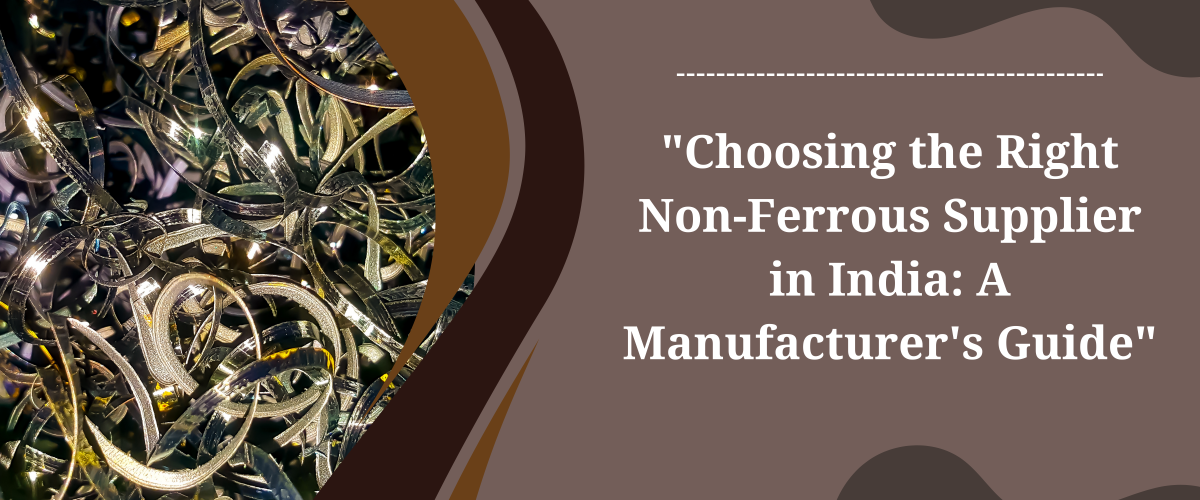
Choosing the Right Non-Ferrous Supplier in India: A Manufacturer's Guide
In today’s competitive industrial landscape, selecting the right Non-Ferrous Supplier is crucial for manufacturers in India. Non-ferrous metals, including aluminum, copper, zinc, and nickel, are indispensable in various industries due to their resistance to corrosion, lightweight properties, and high conductivity. Choosing a reliable Non-Ferrous Supplier can significantly impact the quality and efficiency of your production processes. This guide will help manufacturers navigate the selection process by highlighting key factors to consider when choosing a Non-Ferrous Supplier in India.
1. Understanding the Importance of Non-Ferrous Metals
Before diving into how to choose the right Non-Ferrous Supplier, it’s essential to understand the role that Non-Ferrous Metals play in manufacturing. These metals are widely used in automotive, aerospace, construction, and electrical industries due to their unique properties. For instance, aluminum is prized for its lightweight and corrosion resistance, making it ideal for automotive and aerospace applications. Copper’s excellent electrical conductivity makes it a preferred choice in electrical wiring and electronics.
Lorem ipsum dolor sit amet, consectetur adipiscing elit. Ut elit tellus, luctus nec ullamcorper mattis, pulvinar dapibus leo. Lorem ipsum dolor sit amet, consectetur adipiscing elit. Ut elit tellus, luctus nec ullamcorper mattis, pulvinar dapibus leo. Lorem ipsum dolor sit amet, consectetur adipiscing elit. Ut elit tellus, luctus nec ullamcorper mattis, pulvinar dapibus leo.
2. Assessing the Quality of Non-Ferrous Metals Supplied
Quality is a critical factor when choosing a Non-Ferrous Supplier. The quality of Non-Ferrous Metals directly impacts the performance and durability of the final products. Manufacturers should look for suppliers who adhere to strict quality control measures and have certifications that attest to the quality of their products. This includes ISO certification, which ensures that the Non-Ferrous Metals supplied meet international standards.
In addition to certifications, manufacturers should request samples or conduct tests on the **Non-Ferrous Metals** to ensure they meet the required specifications. A reputable Non-Ferrous Supplier will be transparent about their quality control processes and willing to provide documentation that supports the quality of their products.
3. Evaluating the Supplier’s Industry Experience
Experience in the industry is another crucial factor when selecting a Non-Ferrous Supplier. Suppliers with extensive experience in the non-ferrous metals industry are more likely to understand the unique challenges and requirements of different sectors. They can provide valuable insights and recommendations on the most suitable Non-Ferrous Metals for specific applications.
When evaluating potential suppliers, consider their track record in supplying Non-Ferrous Metals to industries similar to yours. Ask about their experience in handling large orders, their ability to meet tight deadlines, and their familiarity with the latest industry trends and technologies. A seasoned Non-Ferrous Supplierwill have a deep understanding of the market and be able to offer solutions that align with your business needs
4. Assessing the Range of Non-Ferrous Metals Offered
The range of Non-Ferrous Metals offered by a supplier is another important consideration. Manufacturers often require different types of Non-Ferrous Metals for various applications, and working with a supplier who offers a comprehensive range can simplify the procurement process. A diverse product portfolio ensures that you can source all the necessary materials from a single Non-Ferrous Supplier saving time and reducing logistical complexities.
In addition to the variety of metals, check if the supplier offers customized solutions, such as specific alloy compositions or metal processing services. A Non-Ferrous Supplier who can tailor their offerings to meet your exact specifications will provide added value to your manufacturing processes.
5. Considering the Supplier’s Supply Chain and Delivery Capabilities
A reliable supply chain is essential for maintaining uninterrupted production. When choosing a Non-Ferrous Supplier in India, manufacturers should consider the supplier’s supply chain and delivery capabilities. Delays in the supply of Non-Ferrous Metals can disrupt production schedules and lead to costly downtime.
Assess the supplier’s logistics network, their ability to maintain consistent stock levels, and their delivery timelines. A dependable Non-Ferrous Supplier will have a robust supply chain that ensures timely delivery of metals, even during periods of high demand. They should also have contingency plans in place to address any potential disruptions in the supply chain.
6. Evaluating the Supplier’s Customer Service and Support
Customer service is a key differentiator when choosing a Non-Ferrous Supplier. Manufacturers should work with suppliers who are responsive, reliable, and committed to building long-term relationships. Effective communication, prompt responses to inquiries, and a willingness to address any issues that arise are indicators of a supplier’s dedication to customer satisfaction.
In addition to customer service, consider the level of technical support provided by the supplier. Manufacturers may require guidance on the selection and use of Non-Ferrous Metals. A knowledgeable Non-Ferrous Supplier will offer expert advice and support to ensure that the metals supplied meet the specific needs of your production processes.
7. Analyzing the Supplier’s Pricing Structure
Price is always a significant consideration in the procurement process. However, manufacturers should be cautious of choosing a Non-Ferrous Supplier based solely on price. The cheapest option may not always be the best in terms of quality and reliability. Instead, focus on finding a supplier who offers competitive pricing without compromising on the quality of the Non-Ferrous Metals.
When evaluating pricing, consider the total cost of ownership, including factors such as delivery charges, payment terms, and any additional services provided by the supplier. A transparent pricing structure with no hidden costs is a sign of a trustworthy Non-Ferrous Supplier.
8. Checking the Supplier’s Reputation and References
Finally, it’s essential to check the reputation of the Non-Ferrous Supplier before making a decision. Look for reviews, testimonials, and case studies that highlight the supplier’s track record in delivering high-quality Non-Ferrous Metals. Additionally, ask for references from existing clients who can provide insights into the supplier’s reliability, product quality, and customer service.
A Non-Ferrous Supplier with a strong reputation in the industry is more likely to be a reliable partner for your business. Positive feedback from other manufacturers can give you confidence in your choice and help you avoid potential issues in the future.
Conclusion:
Choosing the right Non-Ferrous Supplier in India is a critical decision that can have a lasting impact on your manufacturing operations. By considering factors such as quality, experience, range of products, supply chain capabilities, customer service, pricing, and reputation, manufacturers can make an informed choice that aligns with their business needs. A reliable Non-Ferrous Supplier will not only provide high-quality metals but also contribute to the overall success of your production processes.
FAQs About Non-Ferrous Metals Market Trends
Non-ferrous metals are metals that do not contain iron and are valued for their lightweight, corrosion resistance, and electrical conductivity properties.
Industries such as automotive, construction, electronics, aerospace, and telecommunications rely on non-ferrous metals for various applications.
Mining and processing of non-ferrous metals can lead to environmental impacts such as habitat destruction, water pollution, and carbon emissions. Sustainable practices and technological innovations are being implemented to mitigate these challenges.
India is emerging as a significant player in the global non-ferrous metals market due to its expanding industrial base, infrastructure development, and increasing consumer demand for metal products.
The market is expected to grow steadily, driven by technological advancements, urbanization, and infrastructure investments. Innovations in material sciences and sustainable practices will shape the future of the non-ferrous metals industry.
